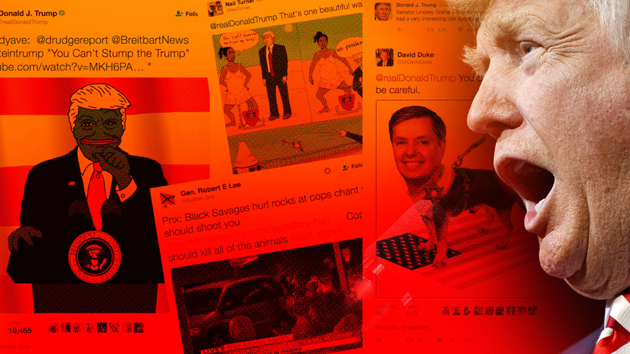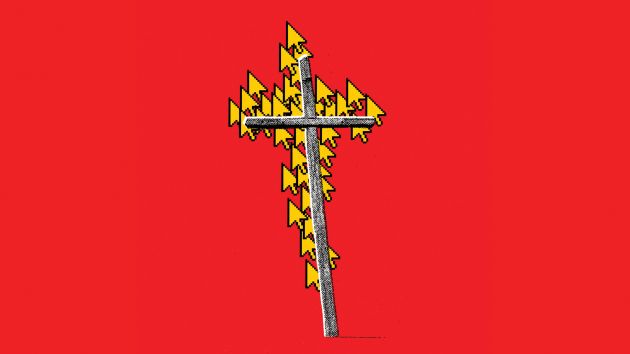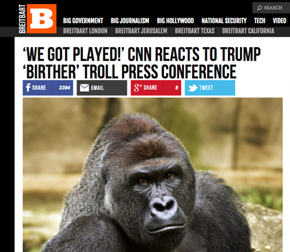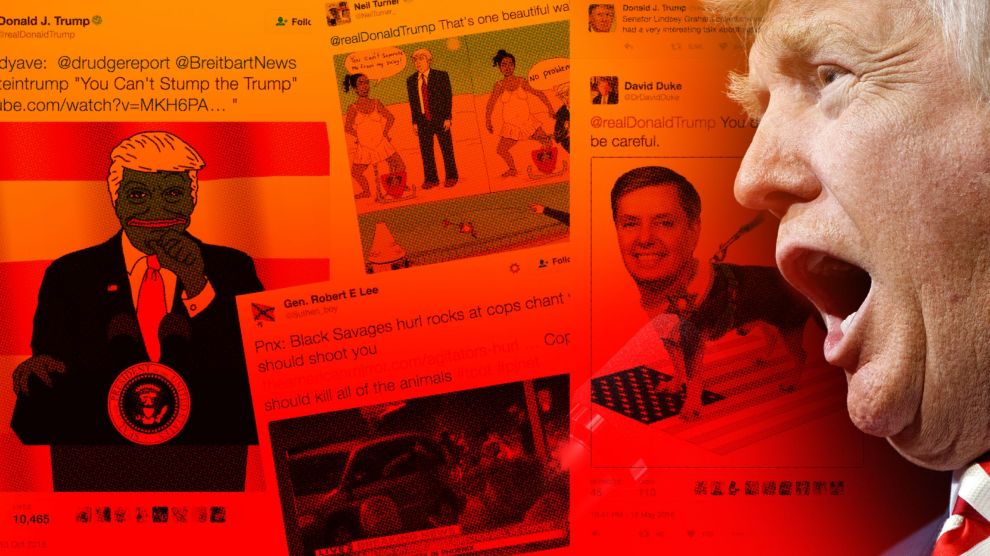Editor’s note: Several weeks after this story published in October, Spencer gave a triumphant speech at a conference in Washington describing America as a “white country” and proclaiming, “Hail Trump, hail our people, hail victory!” He was met with cheers and Nazi salutes. Read more in our investigation of how the white nationalist movement capitalized on the Trump campaign.
Richard Spencer uses chopsticks to deftly pluck slivers of togarashi-crusted ahi from a rectangular plate. He is sitting in the Continental-style lounge of the Firebrand Hotel, near his home in the upscale resort town of Whitefish, Montana, discussing a subject not typically broached in polite company. “Race is something between a breed and an actual species,” he says, likening the differences between whites and people of color to those between golden retrievers and basset hounds. “It’s that powerful.”
We are well into our third round of Arrogant Frog, a merlot that Spencer chose because its name reminds him of Pepe, the cartoon frog commandeered as a mascot by the “alt-right” movement that has been thrust from the shadows by Donald Trump’s presidential campaign. Spencer says Pepe could also be seen as the reincarnation of an ancient Egyptian frog deity, Kek: “He is basically using the alt-right to unleash chaos and change the world,” he says, looking slightly annoyed when I crack a smile. “You might say, ‘Wow,’ but this is literally how religions arise.”
If Pepe is the alt-right’s god, then Spencer is its self-styled prophet. A 38-year-old Duke Ph.D. dropout who sometimes resides in a Bavarian-style mansion at the edge of a ski slope, he has for years been quite literally shouting into the wilderness, proclaiming to anyone who will listen that the alt-right, whose name he coined in 2008, is the only political movement that really gives a damn about white Americans. In Spencer’s view, if you aren’t a white American, that’s fine—but you should leave.
An articulate and well-dressed former football player with prom-king good looks and a “fashy” (as in fascism) haircut—long on top, buzzed on the sides—Spencer has managed to seize on an extraordinary presidential election to give overt racism a new veneer of radical chic. In some ways he resembles an older generation of “academic racists”—or “racialists,” as he prefers to put it—who’ve long sought to professionalize a movement associated with Nazis and the Ku Klux Klan. What sets him apart is his rock star status among a certain fringe that delights in making racist comments pseudonymously on the internet. They idolize Spencer for embracing life as a public heretic and appearing to lend an air of respectability to white nationalist views. You could call him the alt-right’s outlaw version of William F. Buckley, if Buckley had been down with millennials and into shitlords and dank memes.
Spencer subscribes zealously to the idea that America’s white population is endangered, thanks to multiculturalism and lax immigration policies that have gone unchallenged by mainstream conservatives—or, as Spencer and the alt-righters call them, “cuckservatives.” He envisions a future for the United States along the lines of “a renewed Roman Empire,” a dictatorship where the main criteria for citizenship would be whiteness. “You cannot view another white person as your enemy,” he says.
When asked who would qualify as white, Spencer’s reasoning quickly turns arcane, if not tortured—he invokes a mix of race, culture, and geography—but the answer definitely does not include blacks, Asians, Muslims, Jews, and most Hispanics. Spencer knows that a white ethnostate is at most a distant dream, but his more immediate desire is to shift the bounds of accepted political discourse. He hopes America’s nonwhites can be made to agree that returning to the lands of their ancestors would be best for everyone: “It’s like presenting to an African that this hasn’t worked out,” he says. “We haven’t made each other happier. We are going to have to take part in this paradigmatic shift together.”
For years, Spencer’s “identitarian” movement barely flickered in the dark corners of the internet on sites such as Reddit and 4chan. But Trump’s ascendancy was like kerosene dumped on a brushfire. From day one, the Republican insurgent sounded themes dear to the alt-right—his official campaign launch in the lobby of Trump Tower in June 2015, when he vowed to crack down on Mexican criminals and “rapists,” was simply the first clarion call. Ever since, Trump’s tacit embrace of the alt-right’s favorite media outlets and shrillest online voices has emboldened the movement beyond Spencer’s wildest dreams. (When Trump retweeted the user @WhiteGenocideTM this past January, Spencer responded, “Wow. Just wow.“) Regardless of the election outcome, Spencer believes the alt-right’s views will continue to seep into mainstream American politics, in the form of a renewed focus on deporting undocumented immigrants and perhaps even the establishment of a Congressional White Caucus.
In August, Hillary Clinton declared in a speech that “the emerging racist ideology known as the alt-right” had through Trump “effectively taken over the Republican Party.” Watching that speech from a hotel room while on vacation in Tokyo, Spencer could hardly believe his good fortune. Suddenly his inbox was flooded with interview requests from national political reporters; in a hasty Skype call with Michelle Goldberg of Slate—a Jew, he figured, but “it’s hard not to be” in the media—he confidently asserted that he’d “made it.”
During our conversation over dinner, Spencer further recalled how he capitalized on his newfound fame. Back in the states soon after the Clinton speech, he found himself arguing over the phone with a representative from the National Press Club. He’d paid to hold a media event there on September 9, but the Press Club backed out citing security concerns, and then admitted, Spencer claims, that he made its employees uncomfortable. (The National Press Club declined to comment.) He arranged instead for reporters to meet at the entrance of the Old Ebbitt Grill, where an emissary in a charcoal suit and brown tie would direct them to an undisclosed location.
“The alt-right is in a way conservatives who don’t have anything to conserve anymore,” Spencer told the crowd of mostly DC reporters, now assembled in a nearby hotel lounge. Lamenting the decay and degeneracy of modern America, he decried as “total hokum nonsense” the idea that America’s Founding Fathers thought all races were created equal. “Race is real, race matters, and race is the foundation of identity,” he said, flanked by a vaguely Star Wars-looking alt-right logo of his own creation.
Later that evening, Spencer and a who’s who of white nationalists met for dinner at the low-lit Tabard Inn, a classic Dupont Circle watering hole. The group included Jared Taylor, who runs the website American Renaissance and has been dubbed a “coat-and-tie racist” by the Southern Poverty Law Center, and Peter Brimelow, the white-haired founder of the anti-immigration website VDare. Amid the many rounds of toasts, someone recalled a scene from the movie Captain Phillips in which a Somali pirate wielding an assault rifle barges onto the bridge of Tom Hanks’ cargo ship. “Look at me! Look at me!” says the wild-eyed pirate. “I’m the captain now!”
Spencer and his companions started riffing: “Look at me! Look at me! I the GOP now!…I conservatism now!…I establishment now!”
With his blandly named National Policy Institute, Spencer aspires to the stature of today’s Heritage Foundation or Cato Institute. But his is not the only vision competing for the mantle of the alt-right; he believes the movement is being pulled in a more moderate direction—if you can call it that—by Trump campaign CEO Stephen Bannon, formerly the executive chairman of Breitbart News, and Breitbart writer Milo Yiannopoulos. Spencer says the Breitbart faction wants to jettison overt racial ideas and instead defend “Western values” and fight “political correctness.” He dubs them “alt-light.”

Nevertheless, Spencer feels he is on his way. “I think if Trump wins we could really legitimately say that he was associated directly with us, with the ‘R[acist]’ word, all sorts of things,” Spencer says. “People will have to recognize us.” (The Trump campaign did not respond to a request for comment.)
Even with a Trump victory looking increasingly remote, Spencer sees a bright future: “I think white identity politics is inevitable. You can’t become a minority and not understand yourself as in jeopardy in some way,” he says. “Conservatism is going to be dead in my lifetime and the question is, who is going to define the right after that? I want to do that.”
Growing up in a wealthy part of Dallas in the 1990s, Richard Bertrand Spencer attended St. Mark’s School of Texas, an elite, all-boys prep school long associated with blue-blooded conservatism. (I was also a student there around the same time.) George W. Bush lived in the same neighborhood and sent his daughters to St. Mark’s sister school, Hockaday. Spencer’s father, an ophthalmologist, did not care much about politics but voted Republican out of habit. Spencer played varsity football and baseball and hung out with the popular crowd.
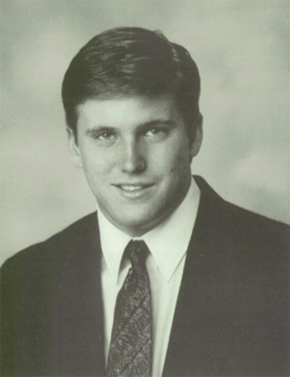
Every Thursday after school, Spencer, his mom, and his sister would order pizza from Domino’s and watch Family Ties and The Cosby Show. Spencer was friends with the only African American student in his class, John Lewis, and once invited him for a sleepover. Lewis says he never thought of Spencer as racist, but another classmate who asked not to be identified recalls Spencer making “a bunch of conservative, racially laced comments” that were objectionable even in high school. Spencer says he has no memory of this and attributes the recollection to “backward projection,” noting that he did not think much about race back then.
After graduating high school in 1997, Spencer went to the University of Virginia, where he double-majored in music and English and became deeply involved in avant-garde theater, trying out and discarding various radical ideologies like costume changes. The writings of Friedrich Nietzsche made a lasting impression; Spencer found his critiques of equality and democracy darkly compelling. He identified with the German philosopher’s unapologetically elitist embrace of “great men” such as Napoleon Bonaparte and the composer Richard Wagner. Yet Spencer found little in Nietzsche about the organization of the state; it was only after entering the humanities master’s program at the University of Chicago that he discovered Jared Taylor, a self-proclaimed “race realist” who argues that blacks and Hispanics are a genetic drag on Western society.
Years later, Spencer would through his Radix Journal help spread a metaphor used to explain the jarring experience of waking up to a different worldview. In the 1999 movie The Matrix, the character Morpheus (who is black, incidentally) offers Keanu Reeves a choice between taking a blue pill—”the story ends, you wake up in your bed and believe whatever you want to believe”—or a red pill, which shows “how deep the rabbit hole goes.” In the alt-right’s telling, the so-called “normies” swallow the blue pill, digesting the fiction of racial equality, while those who get “red pilled” are stripped of the virtual-reality cloak that blinds them, waking up to the shattering realization that liberalism is just a mirage designed to obscure the hard, ugly truths of a world programmed by genetics. “You’re destroyed by it,” Spencer says, “and put back together again.”
After getting red pilled—foremost from his exposure to Taylor online, he says—Spencer began quietly pursuing related ideas through his academic work. He was attracted to the writings of the late University of Chicago professor Leo Strauss, a Jewish German-born philosopher who had been accused by some of supporting fascism. Spencer’s master’s thesis was an analysis of German philosopher Theodor Adorno, who he argued was afraid to admit how much he loved the music of Wagner because Wagner was an anti-Semite championed by the Nazis. “If you looked at what I was doing, there was a clear interest in radical traditionalist right-wing German philosophy, a semi-fascist type thing,” Spencer says. “But there was always plausible deniability to it all.”
By the time he entered Duke as a Ph.D. student in European intellectual history in 2005, his views were on his sleeve. Fellow students recall Spencer openly sharing his opinions on biological differences between races and endorsing books such as Harvard professor Samuel Huntington’s Who Are We?, which argues that Hispanic immigrants are less suited than Europeans for assimilation. One Caucasian woman who was a student at the time recalls Spencer saying that people with her level of education needed to bear more children. Yet Spencer was charming enough to maintain collegial relations with his peers; an official graduate student party that he hosted at his spacious apartment was well attended. “Not many of us had ever come across as an out-and-out fascist,” says a college professor who studied in the same history Ph.D. program as Spencer. “We didn’t know how serious he was.” (Spencer says he is not a fascist.)
Spencer was more explicit about his views on race and immigration with members of the Duke Conservative Union, where he says he clicked with a columnist for the campus newspaper and fellow DCU member named Stephen Miller. Miller—who would earn acclaim for standing up for white lacrosse players falsely accused of gang raping a black woman—is now a senior adviser to the Trump campaign.
Spencer also defended the Duke lacrosse players, writing about the case for The American Conservative—but that’s not the only reason he and Miller hit it off. Spencer says Miller helped him with fundraising and promotion for an on-campus debate on immigration policy that Spencer organized in 2007 featuring influential white nationalist Peter Brimelow. Another former member of the DCU confirmed that Miller and Spencer worked together on the event. At DCU meetings, according to a past president for the group, Miller denounced multiculturalism and expressed concerns that immigrants from non-European countries were not assimilating.
“It’s funny no one’s picked up on the Stephen Miller connection,” Spencer says. “I knew him very well when I was at Duke. But I am kind of glad no one’s talked about this because I don’t want to harm Trump.”
Miller did not respond on the record to specific questions about his activities with the DCU or his views on immigration, but he denied being close to Spencer. “I have absolutely no relationship with Mr. Spencer,” he wrote in an email to Mother Jones. “I completely repudiate his views, and his claims are 100 percent false.”
After dropping out of Duke, Spencer remained preoccupied with race while at The American Conservative, where he became an editor in 2007. Since its founding in 2002 by the paleoconservative and erstwhile presidential candidate Pat Buchanan and others, TAC had given voice to a ragtag group of Iraq War opponents, protectionists, anti-immigration activists, and Ron Paul libertarians, but Spencer was “a bit extreme for us,” recalls TAC editor Scott McConnell. After being fired, Spencer moved on to a new job as the sole editor of Taki’s Magazine, the online vanity publication of Taki Theodoracopulos, the scion of a Greek shipping magnate who was notorious for his racist remarks.
In Spencer’s telling, he steadily evolved Taki’s into a magazine aimed at white nationalists. By 2009 he’d published essays by Jared Taylor and was regularly using the term “alternative right” in its pages to describe his youthful brand of anti-war, anti-immigration, pro-white conservatism. In December 2009, Spencer left Taki’s to start AlternativeRight.com. The site caught the attention of the conservative publisher William Regnery II, who’d tried to start a whites-only online dating service, and, more recently, funded the white nationalist National Policy Institute. (His grandfather, William Regnery I, had bankrolled the America First Committee’s campaign against fighting Nazi Germany during World War II, and his uncle, Henry, founded the conservative Regnery Publishing, which is known for printing Ann Coulter’s books). With Regnery’s backing, Spencer took over NPI in 2011 and began championing its message.
But Spencer’s evolution into a hardcore ethno-nationalist was perhaps not as seamless as he makes it seem. In late 2007, he dated a woman who is Asian American. The two met when she was working for Ron Paul’s presidential campaign.
“I am not the only Asian girl he has dated,” says Spencer’s ex, who spoke to me on the condition that her name not be disclosed. She said she’d initially been turned off by his talk of race-based behavioral differences, but she eventually softened to the idea. They dated for four months, including a trip she took with him to Texas to attend his high school reunion. She says she eventually broke up with him, but not because he was too politically radical. “We all have inconsistencies,” she said. “Especially with love. How can you control your heart?”
I asked Spencer about his Asian ex as he was digging into a bowl of Thai noodles at an eclectic restaurant in the quaint downtown of Whitefish. He seemed shocked that I’d brought it up, and peppered me with questions about how I’d found out. “I would rather you didn’t write about that,” he said, adding later: “You are probably going to nail me with this…I think some people in the movement would probably find that terrible.” He confirmed that she was not the only Asian woman he’d been with, but he said the relationships predated his evolution into a white nationalist.
Though Spencer now opposes interracial relationships, white nationalists have long looked east for inspiration—Hitler regarded Chinese and Japanese history as “superior to our own.” Jared Taylor and William Johnson, the leader of the white nationalist American Freedom Party, both speak fluent Japanese. “There is something about the Asian girls,” Spencer said. “They are cute. They are smart. They have a kind of thing going on. If I am looking at my own life objectively, it really doesn’t surprise me that much.”
The town of Whitefish, where Spencer has lived since 2014, sits in a scenic river valley nestled in Montana’s Flathead Range, some 40 miles from the Canadian border. Over three days there in late September, it was tough to spot nonwhites. The hotel maids were white, the busboys were white, and the landscapers were white. But while this is part of why Whitefish appeals to Spencer, the town is not particularly thrilled with his presence. Several local restaurants have refused to serve him. He was compelled to resign his membership from the exclusive Big Mountain Ski Club after he got into a chairlift argument about the Iraq War with the neocon Randy Scheunemann, a former adviser to US Defense Secretary Donald Rumsfeld and to John McCain in the 2008 election. In 2014, a local human rights group known as Love Lives Here urged the city to bar Spencer from conducting NPI business in town but settled for a resolution condemning hate groups.
A multicolored Love Lives Here poster hangs in the window of the Whitefish Hostel, near an apartment building recently erected by Spencer’s mother (who also owns the Bavarian-style mansion Spencer has lived in). Hostel co-owner Kirtlye Lohof seemed amused by Spencer and his concept of racial boundaries, noting that she’d initially thought Spencer’s wife, Nina Spencer, had a non-white ethnic background. “Then someone said no, she’s just dark-haired Russian,” Lohof said, taking a break from making organic smoothies.
Nina Spencer has translated the writings of Alexander Dugin, a prominent far-right Russian nationalist; she and Spencer have each appeared on Russia Today, the Kremlin’s English-language news and propaganda network. Some commenters on white-nationalist blogs have speculated that Nina Spencer is part Tatar, a predominately Muslim ethnic group. (Spencer says his wife is not Tatar, but is one quarter Georgian, a predominately Christian ethnic minority in Russia that also spans into Greece, Turkey, and Iran. Nina Spencer declined to comment on the record for this story; the couple is currently undergoing a separation.) Spencer calls Russia “the most powerful white power in the world” and admires Vladimir Putin’s authoritarianism—he would gladly admit most Russians into his ideal ethnostate.
Spencer’s “racialism” did not become much clearer during one of our conversations in which he asked me about my own ethnic background. Had I done 23andMe to determine where my ancestors hailed from? The genealogy service has become popular on the alt-right, even though ancestry is hardly synonymous with race.
“I am 100 percent European,” I told him, thinking it better not to mention that I’m also reportedly 6 percent Ashkenazi Jewish.
“I have 0.1 percent African,” he confessed. “Or something like that.”
Since Spencer appeared to be opening up, I decided to mention the Jewish thing.
“That’s why you are a leftist,” he quipped.
He seemed less amused by our lighthearted sparring when I pointed out that, according to the one-drop rule that dominated American law and culture for much of the 20th century, Spencer is technically black and would therefore be ruled out of a white ethnostate.
“Oh no, that’s absurd!” he protested, no longer smiling. “No one in my family tree…” He trailed off. “I almost wonder if this is thrown in [by 23andMe] for shits and giggles. Like, ‘We’re all Africans.'”
Spencer later clarified that he is “not a puritan” about race and would accept in his ethnostate “someone from southern Italy who might have Moorish blood or African blood but has a sense of Catholicism, has a sense of being Italian.” You have to look at culture and not just race, he further explained. But lighter skin color apparently matters more to Spencer than acculturation when it comes to Hispanics: He says he would let in Jorge Ramos but not George Lopez.
Spencer believes that Hispanics and African Americans have lower average IQs than whites and are more genetically predisposed to commit crimes, ideas that are not accepted by the vast majority of scientists. When pressed about what really sets whites apart, he waxes decidedly unscientific: “I think there is something within the European soul that we haven’t been able to measure yet and maybe we never will,” he says, “and that is a Faustian drive or spirit—a drive to explore, a drive to dominate, a drive to live one’s life dangerously…a drive to explore outer space and the universe. I think there is something within us that we possess and that only we possess.”
On my last afternoon in town, Spencer finally agreed to show me his office. “You might literally be the first non-family-member who is a visitor,” he said, after ushering me through an unmarked door along a commercial strip downtown. On a bookshelf, titles such as IQ & Global Inequality and The Dispossessed Majority shared space with Donald Trump’s The Art of the Deal. A framed poster for a James Bond movie, On Her Majesty’s Secret Service, hung on one wall—Spencer sees Bond as a heroic example of whiteness who is “perpetuating English tradition in the 21st century.” A whiteboard nearby outlined the table of contents for a forthcoming NPI book, a primer on the alt-right that Spencer is editing and wants to publish just in time for a conference the group is scheduled to hold in Washington, DC, less than two weeks after the election. The book is meant for people who may be familiar with alt-light—”someone who reads Milo or something”—but want to go deeper.
NPI’s first conference, held in DC in 2011, drew about 85 people. Its second, in 2013, attracted a little over 100. The following year, Spencer attempted to hold a pan-European conference in Budapest, to be keynoted by Dugin, the right-wing Russian nationalist translated by his wife. But Hungarian officials effectively shut it down, declared Spencer a “national security threat,” arrested him, and banned him for three years from most of the European Union. For this November’s gathering in DC, more than 200 people have already signed up, according to Spencer.
The alt-right’s expansion has been far more dramatic online. Swastikas and Hitler references have long punctuated the irreverent banter on the message boards of Reddit and 4chan, but they are no longer just jokes as they’re swept up in a tide of the alt-right’s newer memes such as Pepe the Frog and Napoleon Trump. Racist trolling has likewise grown in profile and sophistication, as seen most recently with the intense harassment of Ghostbusters actor Leslie Jones by an alt-right Twitter army egged on by Yiannopoulos (whom Twitter permanently suspended over the incident). A move to shut down other popular, often pseudonymous alt-right accounts has engendered a racist code language, with “skypes” and “googles” substituting for “kikes” and “niggers,” for example. Every effort to beat back the trolls prompts denunciations on sites such as The Daily Stormer, The Right Stuff, and Breitbart News, in turn leading to debates in more mainstream publications over the limits of speech.
The crown jewel of the alt-right’s media universe, Breitbart News now rivals the New York Post for traffic. The site often flirts with overt racism, as when it used a picture of Harambe the gorilla to illustrate a story about President Barack Obama and birtherism. Former executive chairman Stephen Bannon long championed anti-Muslim extremists on his daily radio show, and Yiannopoulos has portrayed alt-right figures as “dangerously bright.” Breitbart News also connects to Spencer’s media orbit: The home page editor of Breitbart News, Katie McHugh, until recently dated far-right blogger Kevin DeAnna, who has written articles and appeared in podcasts published by Spencer. (“My relationship was never ‘secret’ but it’s pretty funny it’s newsworthy to a shitlib, meaning you,” McHugh wrote to me when I asked her for comment.) McHugh has drawn attention for her Twitter rants about Mexicans, Muslims, and “Third Worlders”:
Funny how Europeans assimilated, unlike Third Worlders demanding welfare while raping, killing Americans. https://t.co/n1iqggqlwb
— Deplorable Katie (@k_mcq) September 17, 2015
The anger fueling the alt-right can’t be summarily dismissed; it is the product of a white working class left behind by automation, outsourcing, and the era of rising income inequality. “Mainstream conservatism was never able to rethink itself,” says Spencer, who faults the GOP for clinging to an outdated free-market ideology and ignoring the country’s massive demographic shifts. Despite the reality that blacks and Latinos still lag far behind whites in wealth and income, eight years of GOP-sanctioned demagoguery against America’s first black president has made it easier for some working-class whites to be persuaded that the system is rigged against them. In Spencer’s view, similar resentments have cropped up among younger, college-educated whites for whom “enforced multiculturalism” on college campuses is giving shape to a new kind of white identity politics. “The alt-right would not exist if it weren’t for terrible immigration policies and social justice warriors and liberalism and maybe the Barack Obama presidency,” Spencer says. “They made us.”
Then came the real shot in the arm. “Trump brought us from zero to 1,” Spencer says. “He brought us from a movement that was very interesting but ultimately marginal—ultimately disconnected from reality, you could even say. We were talking to ourselves, talking to our own ideas. Now we are still doing that, but we are connected with a campaign, connected with attacking liberals. We’ve come so far.”
When something is bothering Spencer, he likes to go for a hike. At his suggestion, we leave the office and hit a trail just outside of town. The autumn sun hangs low in the sky, making mountain maples glow yellow like tea lanterns. We stop and sit on a bench overlooking a rugged valley, a tableau that reminds Spencer of a painting by the 19th-century German landscape artist Caspar David Friedrich.
“I still feel like we are faking it until we make it,” he confesses. “I mean, in some ways, you’ve got to fucking fake it. You have to project success and project power and kind of make it a self-fulfilling prophecy, but I do have this fear that it’s not going to ultimately get to that. We’ve gotten over the first hurdle, which is ignorance [of the alt-right], and now we need to get over the second hurdle, which is becoming a multimillion-dollar professional movement. I don’t want to go back to paleoconservatism or some intellectual white nationalism that has no connection with politics and the scene. That would be tremendously depressing.”
But he has faith in the Overton window: the idea that the range of acceptable political discourse gets defined by a safe distance between extremes. “If you want to radically shift the Overton window, you need that far-right flank for that to make sense,” he says. “Clearly, we are working with Trump in this way.”
Spencer laments that Trump may have shown up too late to win over an increasingly diverse country, but too early to fully benefit from the alt-right’s emergence. A bigger, more organized alt-right could become an effective opposition movement that is catered to by politicians who need its votes to win elections. Spencer believes this may even coalesce around a more liberal set of economic ideas—nationalized health care, a higher minimum wage—but with those policies only held together by the glue of “white culture.” “We weren’t quite ready for Trump, but we need to get ready right now,” Spencer says, reprising the case he says he has been making lately to potential donors, in hopes of acquiring prestigious office space for NPI in Washington. “We need a footprint that says, ‘We’re here, we’re queer, get used to it.'”
He envisions a beachhead on K Street as part of an evolution toward nothing less than the collapse of the American political system as we know it. “In this weird way that Trump is trying to give mouth-to-mouth resuscitation to America, he’s also, like, bringing America to an end in the sense that he is a first step to white identity politics, which will bring about fragmentation,” Spencer says as we walk back through town. “This is where I am kind of a Hegelian. Whenever you see a phenomenon, you see its negative aspect. There is a dark side to something that is happening, and I think that is Trump’s dark side, that he is reviving America and accelerating…”
He pauses, searching for how to put it.
“Accelerating the crumbling?” I ask, as we head back inside the Firebrand.
“Exactly,” he laughs. “That’s why I love him, yes.”


